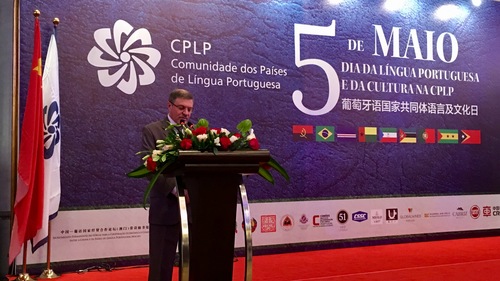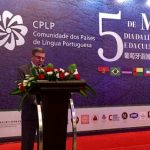 Dr Carlos Figueiredo presents the Libolo Project at CPLP ceremony in Beijing
Dr Carlos Figueiredo presents the Libolo Project at CPLP ceremony in Beijing
Dr Carlos Figueiredo, a senior instructor from the University of Macau’s (UM) Department of Portuguese and the coordinator of the Libolo Project, recently presented the Book of the Libolo Project at the ceremony of the Community of Portuguese Language Countries (CPLP) International Day of the Portuguese Language and Culture held in Beijing, at the invitation of the Embassy of the Republic of Angola in China.
The Libolo Project covers the study of the linguistic, historical, and anthropological aspects of the Libolo Municipality in Angola’s South Kwanza Province. It also allows for a better understanding of the connections among this region, as well as the whole Angola, other African Atlantic Portuguese Speaking Countries, Brazil, and the Caribbean American countries, because between the 16th century and the late 19th century, thousands of slaves were taken from Libolo to these places by Portuguese, Dutch, English, and French slave ships. Composed of 18 scholars from nine universities in Macao, Brazil, and Angola, the project’s team has been collecting and analysing oral data and rare manuscripts on the historical, anthropological, and linguistic aspects of the Libolo region. The studies that focus on the language contact situation in Libolo between the Portuguese language and the African Bantu language spoken in this region provide an opportunity to study and analyse the grammatical features exchanged between these two languages.
Participants in the ceremony included diplomats from the CPLP in China, Portuguese Finance Minister Dr Mário Centeno, deputy secretary-generals of the Permanent Secretariat of Forum for Economic and Trade Co-operation between China and Portuguese-Speaking Countries (Macao), representatives of the Association Macau-Angola, representatives of universities in China that offer Portuguese language courses, Chinese students who have received the Tomás Pereira Prize, and students from Portuguese-speaking Countries studying in China. A total of 400 people attended the event.


